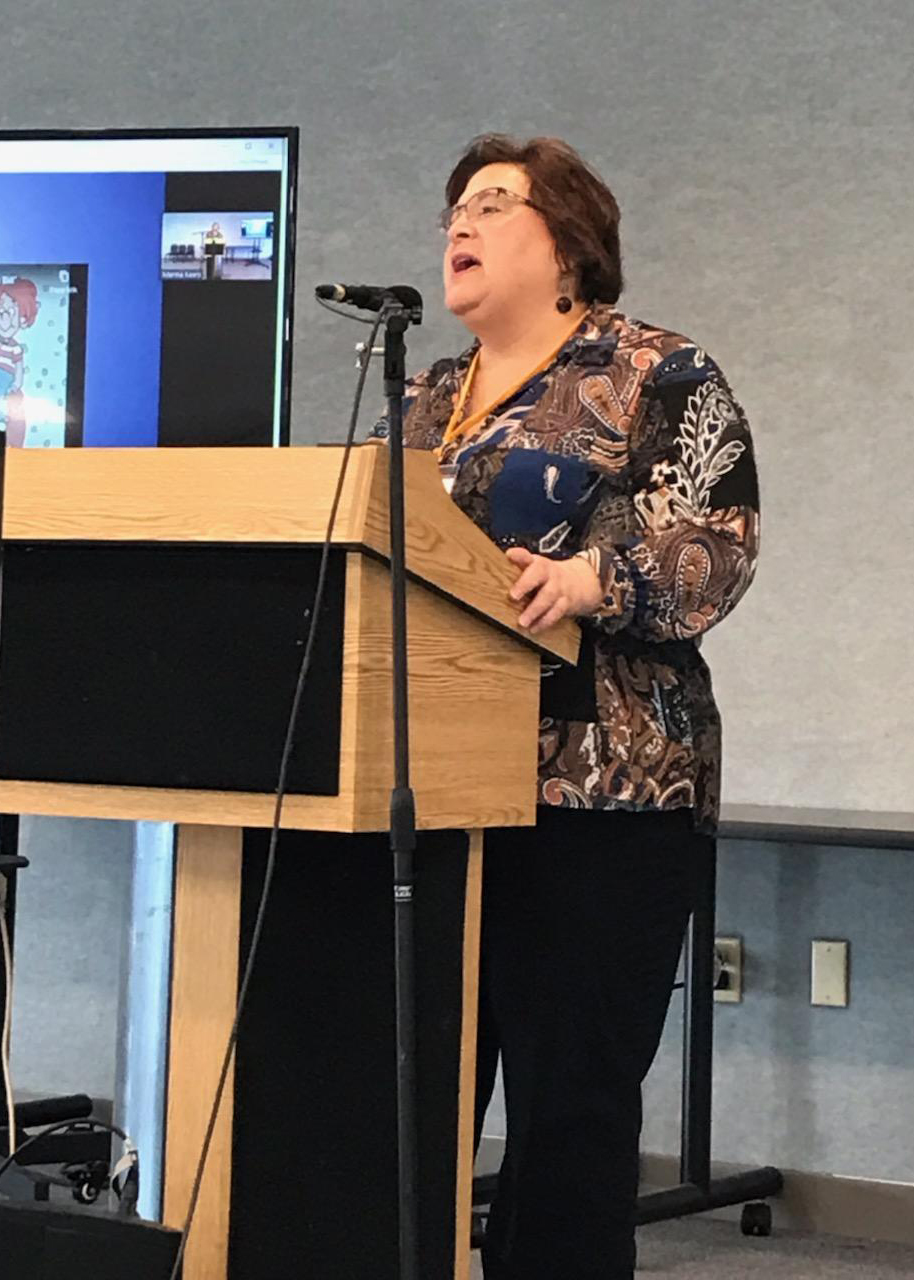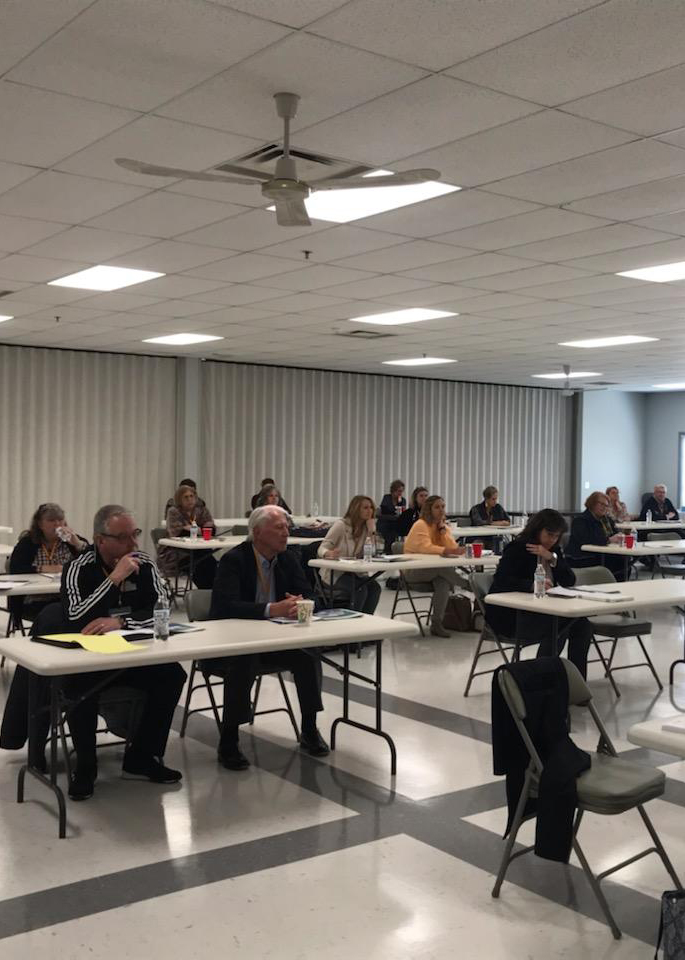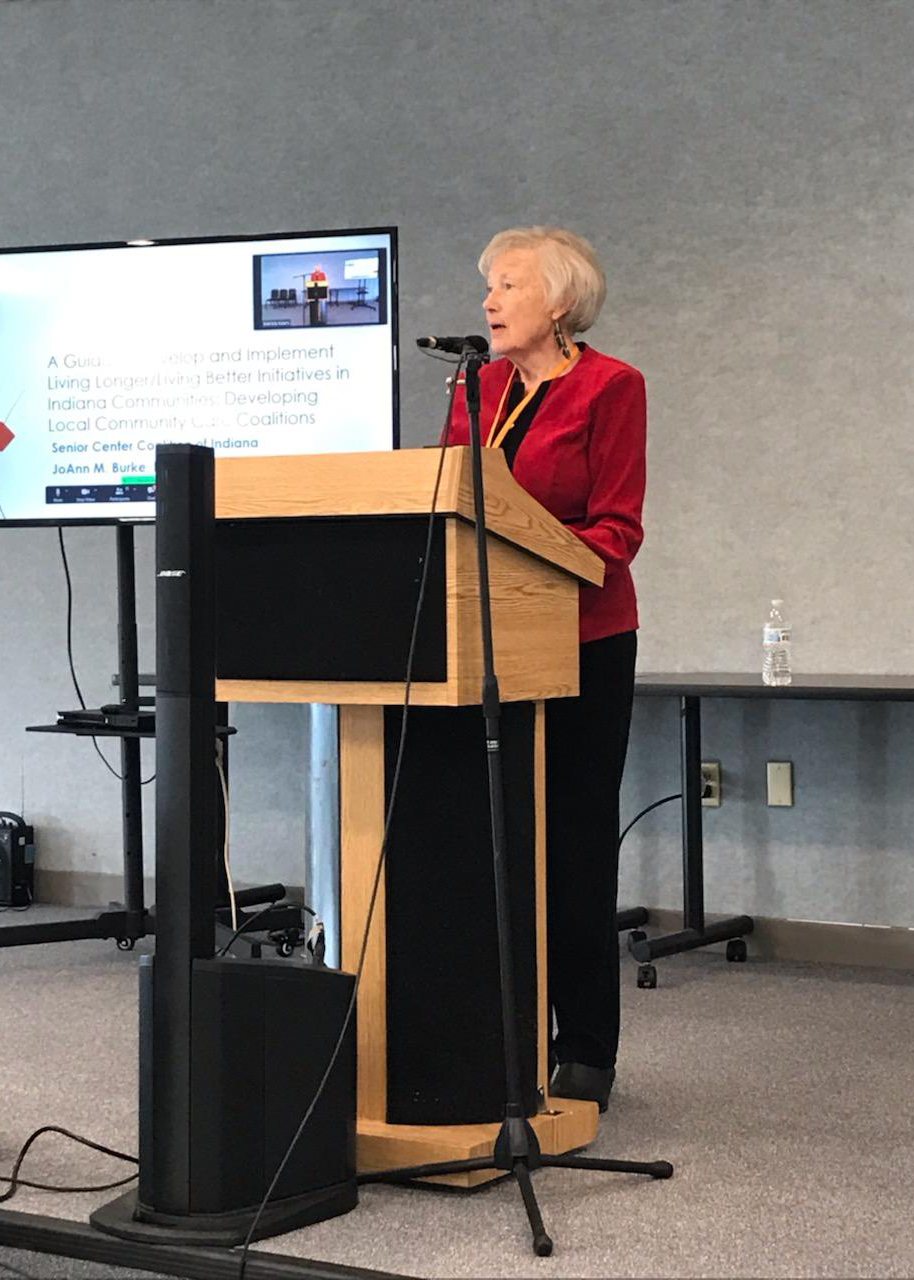
Mission: The Senior Center Coalition of Indiana exists to support, represent, and promote the essential role of senior centers in healthy, vibrant aging.
NEW VIDEO!
If you missed “The Power of Community” — SCCI’s statewide meeting on April 28 — all is not lost! Video of our speakers is now available.
Scroll down or click VIDEOS on the left navigation bar.
UPCOMING EVENTS
BROWN BAG SESSIONS
[Note: There is no Brown Bag Session in May because of the Memorial Day holiday.]
Friday, June 23, 2023; Noon – 1:00 PM Eastern Time
Topic: ANNUAL MEETINGS and ANNUAL REPORTS
If your senior center is a non-profit 501(c)3, these yearly actions are required by law! Have you complied? What are some of your best ideas for turning requirements into an opportunity to connect with your community? Share your experiences (good and bad) with annual meetings and annual reports. This is an open conversation for center leaders, so join us and share your wisdom, concerns, and questions.
ZOOM INFO (same link for all Brown Bag Sessions in 2023, so keep it handy):
https://us02web.zoom.us/j/88146323032
Meeting ID: 881 4632 3032
Add these future BB Session dates to your calendar
[Topics are planned but might change.]
July 28 Senior Center Month Promotion
Aug 25 Facility Security
Sept 22 Fee Structures, Charges for Activities, and Membership
CHANGING THE GAME:
Preparing for a New Era in Long-Term Services and Support



Left: Kristen LaEace reviews the current Indiana legislative session. Middle: SCCI meeting attendees in the Hendricks County Senior Center, Danville, IN. Right: Dr. JoAnn Burke discusses coalition-building.
It was two years in coming, but SCCI met on March 4, 2022, with 40 attendees — in-person and on ZOOM. The topic was “Changing the Game: Preparing for a New Era in Long-Term Services and Support.” Kristen LaEace, CEO of the Indiana Association of Area Agencies on Aging, started the day with a legislative review that included key information about ways non-profit organizations can have an impact on state legislation. See Kristen LaEace’s presentation below.
Dr. JoAnn Burke, Chair of the Indiana Commission on Aging, followed with her advice and experience creating Community Care Coalitions. Collaboration is important as the State of Indiana looks to local communities to provide a greater range of support services to eligible older adults in the near future. Dr. Burke’s presentation was an excerpt from a comprehensive view of Indiana’s plans for localizing LTSS. Her complete slide deck is available below.
History
It was Summer 2019, and a small group of Mill Race Center leaders wanted to survey their peers on a number of issues relating to seniors. First question: “Is there a list of every senior center in Indiana?” Well, the answer was, “No.”
So, they went to work. The list and the resulting survey of nearly 100 Indiana senior center leaders revealed that more than 90% of respondents said they wanted a way to interact with their peers, and three-quarters said they would join a statewide organization. That led to the founding of SCCI – pronounced “sky” – at the end of 2019. Interesting timing.
Despite the eruption of a global health crisis, SCCI continued its advocacy and professional development work with virtual sessions and visual content. It is now endorsing a significant role for senior centers as the State of Indiana redesigns its model of long-term services and support. With an emphasis on wellness and social interaction, senior centers can help forestall the need for elder services and keep older Hoosiers healthy and independent longer.
Team
A team of senior center professionals is currently guiding the development of SCCI. Members of the Guidance Committee are:
- Beverly Ferry, Chief Executive Officer, Living Well in Wabash County Council on Aging, Inc.
- Janis Holiday, Executive Director, Marshall County Council on Aging
- Deborah Jones, SCCI Meeting Director
- Marina Keers, Executive Director, Hendricks County Senior Services
- Cara Kellerman, Executive Director, Encore Lifestyle & Enrichment Center (Tipton County)
- Dan Mustard, Executive Director, Mill Race Center (Bartholomew County)
- Bob Pitman, Executive Director Emeritus, Mill Race Center
Resources
SPECIAL ANNOUNCEMENT: NISC MEMBERSHIP IS NOW FREE
The National Institute of Senior Centers is dedicated to serving senior center
professionals like you nationwide.
Why join? Well, the benefits are many, but let NISC tell the story.
Download the Flyer
Visit the Website
for more information about how to join!
Standards o Best Practices o National Network
Health and Wellness
Indiana State Department of Health
Social Isolation, loneliness in older people pose health risks
Interesting point of view published in the UK – The Lancet: COVID-19 and the consequences of isolating the elderly
From AARP: Why Coronaviruses Hit Older Adults Hardest En español: Por qué el coronavirus afecta más a los adultos mayores
From the National Council on Aging (NCOA): Encouraging older adults to stay active and safe during the coronavirus pandemic
Funding and Grants
From Indiana Grant Watch: funding for COVID-19 related purposes
General Center Operations
From Louisiana State Office AARP: Transforming Senior Centers Into 21st Century Wellness Centers
Videos
Senior Center Coalition of Indiana presents:
How to Avoid Being an Interim Leader
Marina Keers, Hendricks County Senior Services
Senior Center Coalition of Indiana presents:
Building Collaborative Leadership, by Amber Fischvogt, Civic Lab
Senior Center Coalition of Indiana presents:
Ageism, by Tammy Geltmaker and Cathy Wray
Senior Center Coalition of Indiana presents a conversation with:
Dr. Kristina Box, MD, Indiana State Health Commissioner
Leslie Huckleberry, Acting Director of Aging, Family and Social Services Administration
Brown Bag I: Vax Facts: When Can We Play Cards Again?
Recorded via ZOOM
“Beyond the Bake Sale: Fundraising in Difficult Times”
Staying afloat financially has been a challenge for some centers in 2020. Watch a panel of experts discuss how to meet that challenge head on.
Recorded via ZOOM December 3, 2020
“Open, Closed, or Something In-Between?”
How centers are still serving the community even when the sign on the door says, “Closed.”
Recorded via ZOOM October 6, 2020
“COVID-19 and Elders: A Conversation with Dr. Stacie Wenk”
Dr. Wenk, a specialist in geriatrics, talks with Mill Race Center leader Dan Mustard about the particular risks seniors face from the novel coronavirus, COVID-19.
Recorded via ZOOM April 8, 2020
COVID-19
ARE YOU PREPARING TO RE-OPEN YOUR SENIOR CENTER? READ ON
There are currently four underlying principles that are universally included in guidelines:
- If you are sick, stay home.
- Physically distance yourself from others. At the moment, the recommended distance is a minimum of 6 feet.
- Wear a mask for the protection of others.
- Wash your hands often and avoid touching your face.
Points to Consider:
Physical distancing will likely be the new norm until better testing and a vaccine become available.
New protocols for public gatherings will have to be developed. These might include fever screening, masks and gloves. Follow guidance from the Indiana State Department of Health and coordinate with your county health department.
In the earliest phase of your re-opening, consider limiting the performance of all tasks to staff members only, if possible.
Cleaning regimens will have to be implemented. Surface transmission seems to be less likely than was initially believed, but it is still possible. It is recommended that activities that require the touching of shared surfaces, or close proximity be discontinued. Cards, puzzles, etc., fall into that category. Even the most rigorous cleaning is not likely to kill all pathogens including COVID-19; your guests need to bear that in mind. Please see “Potential Strategies” below regarding informed attendance.
In order to maintain recommended minimum physical distance, centers will have to determine new maximum occupancy based on square footage, furniture placement (and/or removal), and type of activity. Which activities require close contact or touching? They will have to be curtailed for the foreseeable future.
Be sure to factor in new use restrictions if your center is a site for other purposes, such as event rentals and community meetings.
Potential Strategies:
- Educate and train your staff, and ensure that there is an adequate supply of facemasks, gloves, and other personal protective equipment. Also, for the protection of staff and guests,
- Establish and enforce the need to report changes in health condition or suspected contact with the COVID-19 virus
- Sanitize the receptionist phone after shift; if possible, assign one person to one phone
- Establish protocols for handling money/mail
- Reinforce safe food handling procedures.
- Balance the number of guests and activities with available staff. As you gain experience with operating under safety protocols, incorporate experienced volunteers and scale up accordingly.
- Work closely with local health officials. Is it possible for a public health representative to be present for the first days of operation to observe precautions as well as assist in trouble-shooting and problem-solving?
- Check ventilation systems to make sure they operate properly; increase circulation of outdoor air as much as possible. If your center has not been used at all during the shutdown period, consult a ventilation expert on restarting systems such as air conditioning to avoid launching molds and bacteria (e.g., Legionnaire’s) from stagnant water into the air.
- Ensure compliance with room capacities. Post limits prominently.
- Limit liability exposure: seek legal advice for wording on signage that states the center cannot guarantee that participants will not come into contact with someone who has the infection, despite best efforts. Some centers have discussed the use of signed waivers.
- Evaluate center’s use by outside organizations, balancing possible revenue against stricter standards for sanitizing and maintaining physical distancing. Be sure rules for use of the center are clearly understood by staff and guests. Consider posting rules at all outside and inside doorways.
- Factor in additional time and cost for cleaning supplies and labor. Grants may be available for COVID-related expenses. Organize fund-raising around re-opening the center.
- Give careful consideration to movement within the center, and look for potential bottlenecks that can cause people to be in close proximity – for instance, entrances to restrooms or short or narrow hallways. Taped floor markings can be an effective reminder. Is it feasible to have a staff member check restrooms (and spot-clean) after use? Controlling the number of people who are in the center at any one time is an essential step in enforcing physical distancing.
- Develop an action plan in the event that new cases are identified in your facility: closure, contact tracing and notification, staff assignments, etc.
- Add classes that will give program participants the tools needed to access virtual learning and programming opportunities, such as classes for Zoom, Skype, etc.
- Don’t underestimate the new skills and programs that you have developed during the service interruptions and lockdowns. Assess the strategies and virtual programs that have worked during service interruptions and determine if they will still be valid for people with limited mobility, even after centers re-open.
- Share information with staff and guests on the proper care of reusable cloth masks. They should be washed frequently in very hot water and dried on a high setting, if possible. If they are hand-washed, use hot water and scrub both sides thoroughly. Allow to dry completely.
- Prepare participants for the possibility of scaling back programs if needed once you have been able to see how your precautionary steps are working (or not!).
- Communicate, communicate, communicate.
Frequently Asked Questions
We invited a panel of senior center leaders* with a wide array of experience to answer your questions specifically about serving senior adult clients during the COVID-19 crisis. To submit questions, email covid19questions@millracecenter.org. The goal is to post answers twice a week for now; the frequency will change as necessary.
(Updated 4/23/2020)
- As senior center professionals, we’ve known that what we do is key to combating loneliness among older adults. Now, we have the COVID-19 survey data for support (see above). What is the best way to leverage both our experience and our data with funders and our boards?
It is important to combine the data with the success stories that we know. Instead of telling donors we offer “more than bingo”, we can also demonstrate the value of recreational programming like bingo. Social isolation can lead to serious health problems and our programs make a difference in the lives of older adults. If our recreational programs reduce isolation, that can improve health outcomes. Our seniors appreciate the opportunity to tell others about how the programs we offer benefit them. Ask them to tell their stories. Then, share them with donors. Some donors need you to speak to their minds (data) and others want you to speak to their hearts (stories).
- How does my center keep donations coming in while our services are reduced or curtailed during the COVID-19 epidemic?
As we all know, the key to fundraising is all about relationships. Maintaining good communication is always critical to relationships. If you are providing programming relevant to the epidemic, it is important to share this with your donors and community so that they are aware that you are still providing services.
– Communicate with local foundations, individual donors and the community using social media and e-newsletters. Describe how your work and your services have changed during this crisis.
– Stay in contact with your funders so you know if they are changing priorities to account for the COVID 19 epidemic.
– Communicate how you are helping seniors during this critical time.
– Communication is important, even if you don’t anticipate a gift at this time. Many of our individual donors and small business supporters are struggling with the economic reality right now. You should be sensitive to these challenges and consider their reality before asking for support. Instead, maybe now is a good time to check in on donors and make sure they are doing okay instead of asking for a gift. We can all revisit our fundraising schedules in May or June.
- What do we do about clients who still think everyone is overreacting to the COVID-19 epidemic?
(All three panelists weighed in on this one. Answers have been edited for length.)
I think it takes time for people to make decisions and come to conclusions, especially when the decision impacts so much of their lives. I believe that most people want what is best for themselves and their neighbors. Communication is important. When people know that you are making changes with their best interest in mind, even if they disagree, they will appreciate your care and concern.
[C]ommunication is key, just be sincere. Don’t try to argue the issue. I would add that it is important to keep politics and political commentary out of it. As a non-profit we have to watch that, but it is important at this time to make this about EACH of US. I recommend asking respected leaders to speak, maybe do a public service announcement for the local radio station.
Unfortunately, until it hit close to home some won’t believe it. Depression is setting in for some which is a big concern of mine with my older adult clientele. Idle time=Idle minds. We are going to put together a challenge for some that I know do not have any family. They are contacting us daily with one word describing their day. This gives them something to look forward to, may help us figure their mind set for the day, and see if we need to follow up.
[I]t made an impact when we started wearing masks and gloves. We are passing out meals in a drive-thru fashion. We are also passing out groceries from our pantry. When they see us do it, they start to think about it.
- The COVID-19 pandemic is fatiguing to all who are on the front lines, including senior center leaders. What are some suggestions for keeping our energy up indefinitely?
Normally, teambuilding activities and celebrations re-energize our team. In our office, a shared lunch helps us reconnect and renew when things get tough. Those options are off the table when we work from home, work split hours in the office, and strive to stay six feet apart. Right now, I think we all need to be reminded of our “why” and the reason behind our work. Encourage everyone to tell stories that demonstrate the “why”, and share self-care tips that remind staff to do things they enjoy. Lastly, express gratitude to the team. Emails, phone calls, chat messages, and even cards that express appreciation can brighten someone’s day.
*Meet the panel:
Patti Davis: Manager, Fort Wayne Community Center
Beverly Ferry: Chief Executive Officer, Living Well in Wabash County COA, Inc.
Marina Keers: Executive Director, Hendricks County Senior Services
